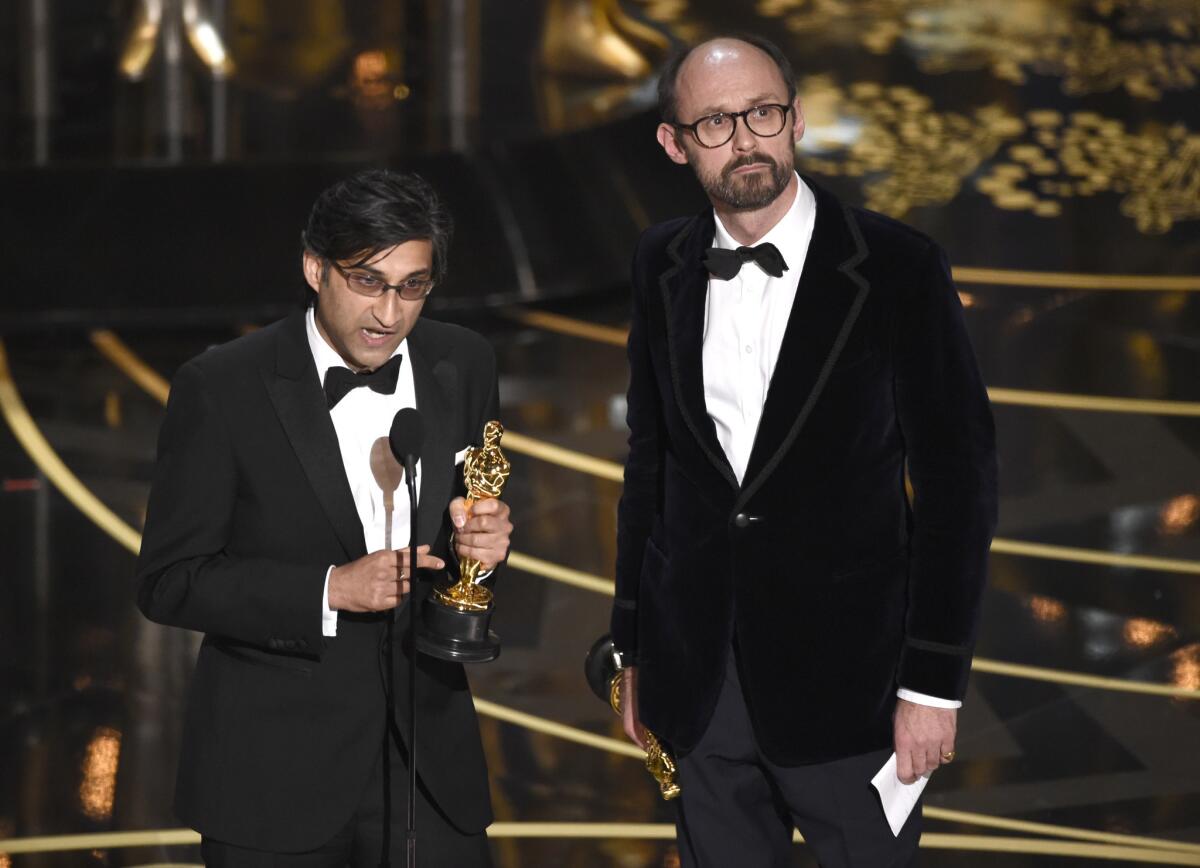‘Amy’ wins Oscar for documentary feature

Asif Kapadia, left, and James Gay-Rees accept the award for best documentary feature for “Amy” at the Oscars on Sunday, Feb. 28, 2016, at the Dolby Theatre in Los Angeles.
“Amy,” directed by Asif Kapadia and produced by James Gay-Rees, won the Oscar for best documentary feature on Sunday night, bringing to a close a particularly unpredictable race.
“Amy” tells the tale of tragically doomed English singer Amy Winehouse, who died in 2011, using archival footage, including startlingly intimate home video, along with interviews from friends, family and colleagues.
OSCARS 2016: Full coverage | Complete list of nominees | Red carpet fashion
“This film is all about Amy,” said Kapadia in accepting the award. “This is all about showing the world who she really was, not a tabloid persona, the beautiful girl, the amazing soul, funny, intelligent, witty, someone special, someone who needed looking after. We just wanted to make a film to show the world who she really was.”
The film brings out the now-obvious strains of autobiography in Winehouse’s music, including songs such as “Rehab,” “Back to Black” and “Love Is a Losing Game.” As her life was overtaken by addiction and bulimia, her story played itself out in increasingly vicious tabloid coverage and she became something of an international punchline. Kapadia’s film points a finger back at the public, in essence asking why nothing could be done to help a young woman in obvious distress.
“Amy” has also had an extremely strong run at the box office, bringing in more than $8 million in the U.S.
Going into Sunday night’s ceremony the category was a tight competition between Kapadia’s “Amy” and Joshua Oppenheimer’s “The Look of Silence.” Matthew Heineman’s “Cartel Land” and Liz Garbus’ “What Happened, Miss Simone?” were also very much in the running. Evgeny Afineevsky’s “Winter on Fire: Ukraine’s Fight for Freedom,” a bracing, up-close look at the 2014 Maidan Square protests in Kiev, was also nominated.
While the academy had long turned away from awarding pop-culture or music-oriented docs, that has shifted dramatically over the last few years.
Recent winners have included “Searching for Sugar Man,” Malik Bendjelloul’s portrait of the rediscovery of the musician known as Rodriguez, and “20 Feet From Stardom,” Morgan Neville’s look at the lives of female back-up singers. Last year the prize went to Laura Poitras’ “Citizenfour,” a look at Edward Snowden and government surveillance policies.
Among the other awards won by “Amy” were the BAFTA, the Producers Guild award, two prizes at the doc-focused Cinema Eye Honors and numerous critics’ prizes.
“The Look of Silence,” besides also being a favorite among critics, won four Cinema Eye Honors, the Gotham Award, the Spirit Award and the International Documentary Assn. award.
“The Look of Silence” is Oppenheimer’s second film chronicling the struggles of the people of Indonesia to come to grips with the genocide that took upward of 1 million lives beginning in 1965. Oppenheimer’s earlier “The Act of Killing” was also nominated for an Oscar. “Silence” is not a sequel but rather a companion piece, as the perspective shifts from that of those who perpetuated the genocide in “Killing” to that of the victims and survivors in “Silence.” One film could not exist without the other, with “The Act of Killing” adding additional emotional heft to “The Look of Silence.”
The certainty of the race between “Amy” and “The Look of Silence” was thrown into doubt when “Cartel Land” director Heineman beat both films to win the documentary award at the Director’s Guild.
In “Cartel Land,” Heineman looks at efforts on both sides of the border region between Arizona and Mexico to curb the drug trade and the influence of criminal cartels. With startling access, the film takes Heineman to a meth lab in the jungle, on ride-alongs with vigilante groups and has him caught in the crossfire of a gun battle.
Garbus’ “What Happened, Miss Simone?” is a look at the life and career of musician Nina Simone, whose influence can be seen in the work of contemporary artists such as Beyoncé. The film gives particular prominence to Simone’s political activism and social consciousness and how it affected her career.
Both “Winter On Fire” and “What Happened, Miss Simone?” were released by Netflix, marking the third year in a row the company has landed a nomination in the category, following previous nominees “Virunga” and “The Square.”
Follow on Twitter: @IndieFocus
More to Read
Only good movies
Get the Indie Focus newsletter, Mark Olsen's weekly guide to the world of cinema.
You may occasionally receive promotional content from the Los Angeles Times.







